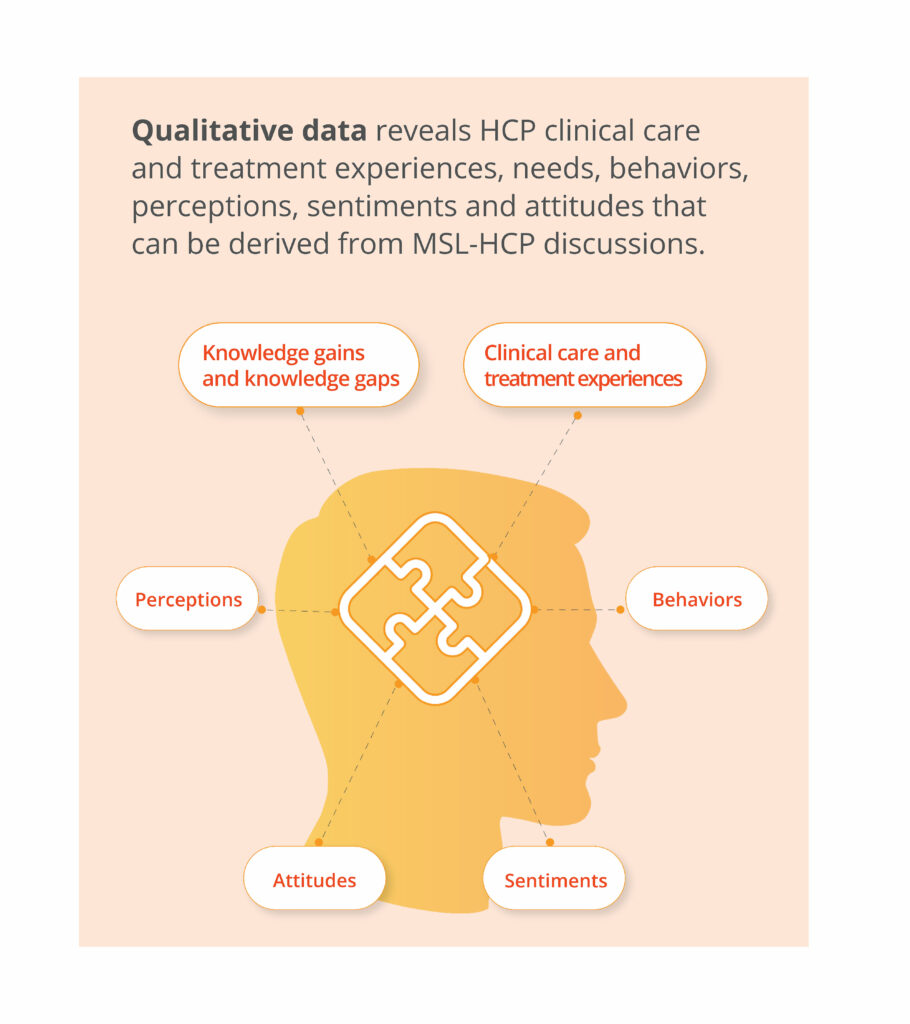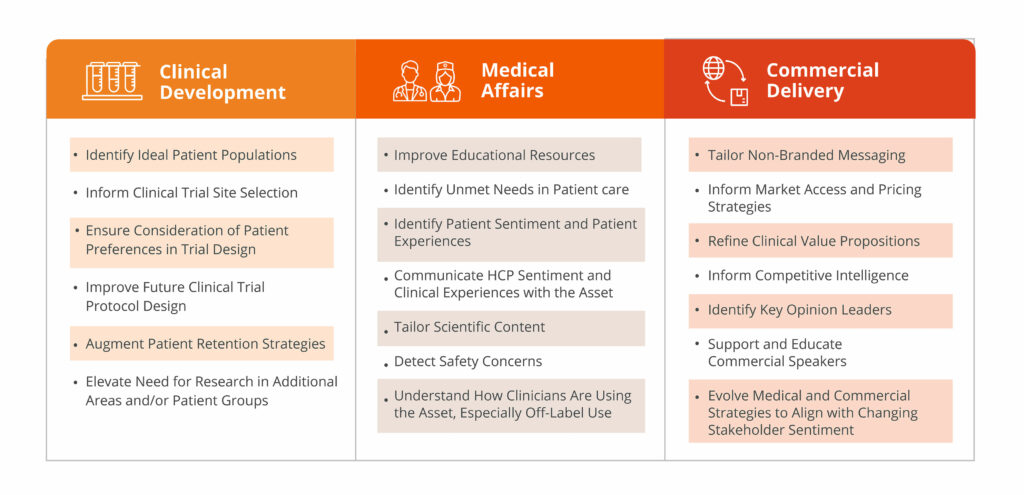Field Medical Affairs exists as a trusted relationship-builder within the medical industry and turns to advance science to help the discussions between MSLs and HCPs on treatment possibilites and scientific concerns.
Field Medical Affairs is an essential bridge between pharmaceutical
clinical development and commercial delivery. Without the imperative of immediate commercial outcomes, Field Medical Affairs also exists as a trusted relationship-builder in which medical science liaisons (MSLs) and healthcare providers (HCPs) can discuss treatment possibilities and scientific concerns candidly.
Historically, the industry has left MSL-HCP interactions to exist on their own, focusing on objective metrics and key performance indicators (KPIs) to inform Medical Affairs impact. This approach does not account for the profound value of these interactions. From a data perspective, they constitute a goldmine of unique and powerful insights that can play an imperative role in shaping clinical development, medical education and commercialization strategies.
Now Field Medical Affairs is turning to advanced data science to help discover and quantify the details of those discussions. The insights will likely reshape how we think about asset development and delivery and will bring about groundbreaking innovations across the asset lifecycle.
Qualitative and Quantitative Data in Medical Affairs
To gauge the true impact of MSL-HCP engagement, Medical Affairs teams must seamlessly blend quantitative and qualitative data. This combined approach extends the influence of Medical Affairs beyond conventional boundaries and can inform both clinical and commercial strategies.
Quantitative data (figure 1) provides essential metrics for outreach strategies. Qualitative data delves deeper, unraveling the nuanced fabric of HCP perceptions, behaviors, needs, and concerns.
Uses for Medical Affairs Qualitative Data Across the Lifecycle:
Clinical
• Identify Ideal patient Populations
• Inform Clinical Trial Site Selection
• Ensure Consideration of Patient Preferences in Trial Design
• Improve Future Clinical Trial Protocol Design
• Augment Patient Retention Strategies
• Elevate Need for Research in Additional Areas and/or Patient Groups

Medical Affairs
• Improve Educational Resources
• Identify Unmet Needs in Patient Care
• Identify Patient Sentiment and Patient Experiences
• Communicate HCP Sentiment and Clinical Experiences with the Asset
• Tailor Scientific Content
• Detect Safety Concerns
• Understand How Clinicians Are Using the Asset, Especially Off- Label Use
Commercial Delivery
• Tailor Non-Branded Messaging
• Inform Market Access and Pricing Strategies
• Refine Clinical Value Propositions
• Inform Competitive Intelligence
• Identify Key Opinion Leaders
• Support and Educate Commercial Speakers
• Evolve Medical and Commercial strategies to align with changing stakeholder sentiment
Effectively Collecting Qualitative Data
 The complexity of qualitative data in Field Medical Affairs necessitates purpose-built content management systems (CRMs) tailored specifically for MSL use. Without such dedicated systems, qualitative data risks being overlooked or relegated to siloed anecdotes. Active listening, thoughtful questioning approaches, and periodic reviews of insights are essential components for extracting actionable value from HCP discussions.
The complexity of qualitative data in Field Medical Affairs necessitates purpose-built content management systems (CRMs) tailored specifically for MSL use. Without such dedicated systems, qualitative data risks being overlooked or relegated to siloed anecdotes. Active listening, thoughtful questioning approaches, and periodic reviews of insights are essential components for extracting actionable value from HCP discussions.
Also, these CRMs must differentiate from sales CRMs because the type of knowledge capture is significantly different.
• Sales representatives reinforce brand messaging, so the number of rep-HCP interactions is key to driving impact
• MSLs speak to the science behind a treatment, so HCP knowledge transfer assessments are key to measuring impact
• Sales representatives have more HCP touchpoints but less in-depth discussion
• MSLs have fewer touchpoints but richer exchanges
A Critical Gap in Industry Practices A recent survey by EPG Health revealed a significant gap in industry practices related to the measurement of HCP knowledge gain. Astonishingly, only 20% of pharmaceutical companies actively measure HCP knowledge gain associated with their education activities. Moreover, less than 5% specifically measure knowledge gaps and subsequent behavior change.1
This discrepancy highlights an opportunity for industry-wide improvement in evaluating the impact of medical education, one that some data experts are beginning to take advantage of.
Platforms designed explicitly for Medical Affairs data capture using Natural Language Models and Artificial Intelligence to summarize and curate discussion details are just becoming available.
The benefits of leveraging Medical Affairs data are multifaceted, transcending organizational and industry boundaries. MSL insights have the potential to deepen relationships with HCPs, ultimately enhancing patient health outcomes. As organizations strive for excellence, expanding quantitative metrics to fully incorporate and utilize the power of qualitative data becomes imperative. Through strategic field medical activities, a compelling narrative emerges, showcasing the invaluable impact of Medical Affairs in driving innovation and improving healthcare delivery.








